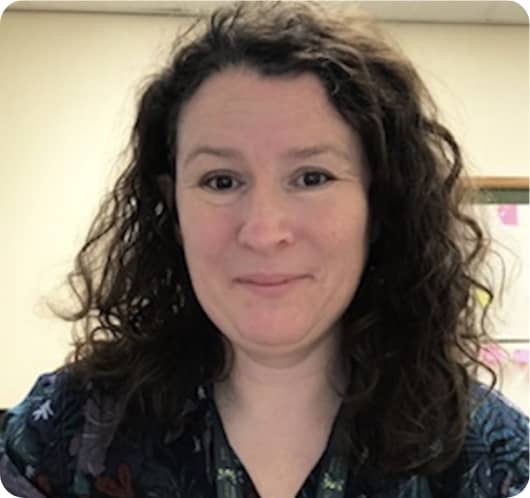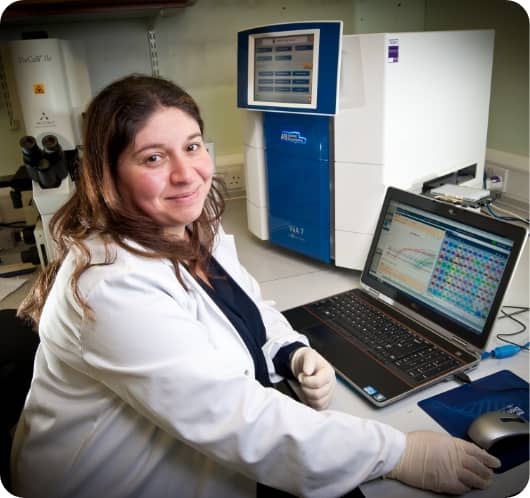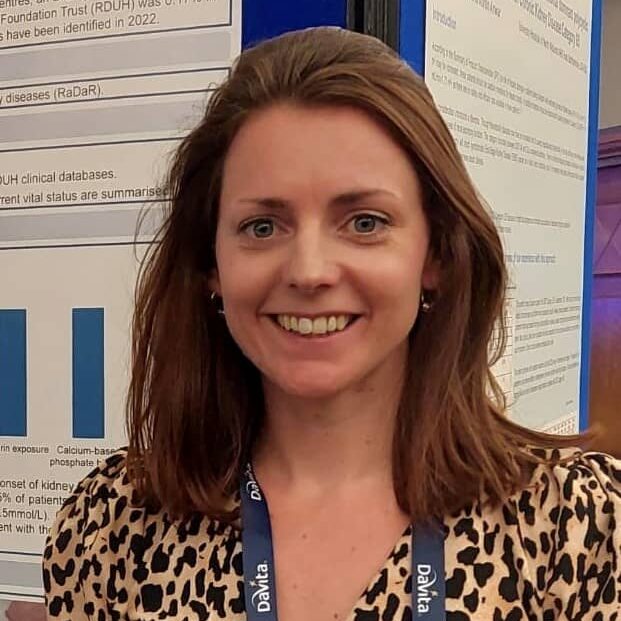Research awarded
Here at Kidney Wales we have the ambition to invest in innovative programmes of research for the benefit of kidney patients in the Welsh community, and we have a long and rich history of doing this.
Current Research Webinar with Kidney Research UK
Take a look at some of the fantastic people and projects we have helped across Wales.

Emma Jones – Bangor University
Research Title:
Why do people say ‘no’ to a kidney transplant? Understanding patient decision making and choice.
A constructivist grounded theory study.
Emma is a renal nurse and has 21 years of nephrology nursing experience, having worked in Betsi Cadwaladr University Health Board as a clinical nurse specialist in pre and post renal transplant nursing, home haemodialysis and peritoneal dialysis, and as a haemodialysis nurse. Emma has a Diploma in Renal Nursing, a BSc Specialist Practitioner Renal Degree, and an MSc in Advanced Clinical Practice.
Emma is currently undertaking her PhD at Bangor University, exploring how people with kidney failure make decisions about kidney transplantation and their experiences of declining the opportunity of having a kidney transplant. Emma is passionate about renal nursing and providing exceptionally high-quality care, and progressing the provision of services that are equitable to all kidney patients and their families. She is particularly interested in patient choice, decision-making, and shared decision-making.
Research Update Feb 23
My PhD journey has been one of self-discovery and has been rewarding in so many ways. Having left my kidney transplant nurse specialist role in January 2021 to start my KESS funded PhD, my first year focused on learning and developing the new research skills needed to progress my research project.
I have carried out a qualitative evidence synthesis to understand people’s decisions when choosing or declining a kidney transplant, which explored decision making preferences of people with chronic kidney disease and the factor’s that influenced their decisions. The findings from this synthesis shed light and contributes new knowledge on how people make decisions and why people choose or decline kidney transplantation and will be published.
During the second year of my PhD, having gained NHS Ethical approval I began recruiting patients from across Wales, to answer the research question ‘Why do people say ‘no’ to a kidney transplant? Understanding patient decision making and choice. A constructivist Grounded Theory study’. Kidney Wales, and charities of Betsi Cadwaladr University Health Board have funded the study through a KESS 2 East scholarship (Knowledge Economy Skills Scholarships (KESS 2 East) which is a pan-Wales higher level skills initiative supported by European Social Fund (ESF) through the Welsh Government and is led by Bangor University on behalf of the HE sector in Wales).
Now in my third year, I am progressing with recruitment though have faced challenges recruiting participants for my study. I have needed NHS Ethics approval to expand recruitment to advertise and promote the study more widely through kidney community charities and kidney patient organisations, also adding a payment of £25 voucher (Amazon or equivalent high street shopping voucher) as a thank you and token of appreciation for their participation in a single semi-structured interview. I have also had Ethical approval to add additional NHS sites in England to support patient recruitment.
This final year will see me completing data collection and analysis and writing up my study findings. Kidney patients will be involved in discussing the findings during the analysis stages, as well as other key stakeholders, Kidney Wales, and renal health care teams.

Dr Soma Meran – Cardiff University
In collaboration with:
Research Title:
Investigating novel mechanisms that drive cardiovascular disease in kidney patients: the relationship between systemic inflammation, alterations in Hyaluronan matrix and vascular calcification in arteries.
lay summary
The leading cause of death in kidney patients is heart-disease. Available treatments for heart-disease don’t work well in kidney patients because they get a different type of heart-disease caused by deposits of calcium and phosphate in their arteries. This is called vascular-calcification (VC) and has no treatment. This proposal aims to better understand what causes VC so that new treatments can be developed to improve cardiac-health in kidney patients.
The leading cause of death in kidney patients is heart-disease. Available treatments for heart-disease don’t work well in kidney patients because they get a different type of heart-disease caused by deposits of calcium and phosphate in their arteries. This is called vascular-calcification (VC) and has no treatment. This proposal aims to better understand what causes VC so that new treatments can be developed to improve cardiac-health in kidney patients.
Kidney patients have heightened systemic-inflammation, and this potentially causes inflammation-associated damage in arteries. We know that VC occurs because the contractile cells in arteries undergo transformation to become bone-like cells. These bone-like cells deposit calcium/phosphate in arteries making them stiff, causing heart-failure and death. We propose that the heightened inflammation in kidney-disease drives changes in the extracellular-matrix (ECM) in arteries, which then promotes the transformation to bone-like cells.
The ECM is the substance that lies in-between cells and is important for controlling cell function and specialisation. Thus, abnormal alterations in ECM are a major contributor to human disease. Hyaluronan is one of the most important constituents of the ECM. We/others have shown that hyaluronan is key regulator of cell transformation in the kidneys, in cancer and during embryology. However, the role of hyaluronan in transformation of cells in our blood-vessels to bone-like-cells during vascular-calcification is unknown.
This proposal uses cell-systems, biological-models and blood-samples from dialysis-patients to investigate:
(1)-The link between heightened-inflammation and changes in hyaluronan-matrix in arteries.
(2)-How inflammation-driven changes in arterial-hyaluronan subsequently influence bone-like cell transformation, calcium/phosphate deposition and vascular-calcification.

Professor Ian Humphreys – Cardiff University
In collaboration with:
Research Title:
Investigating nutritional amino acid regulation of antiviral immunity in kidney transplant patients.
lay summary
Kidney transplant recipients are given drugs to stop their immune system from rejecting their new kidney. However, these drugs also stop the immune system from responding to infections. Transplant recipients are particularly vulnerable to infections caused by viruses, such as human cytomegalovirus (HCMV), and this can result in severe disease. Furthermore, patients’ immune systems often respond poorly to vaccinations and they are therefore more likely to suffer from viral diseases such as COVID-19 despite being vaccinated.
T cells and NK cells are immune cells that protect from viruses. To respond well to infections, these cells have nutritional needs including amino acids, which are building blocks of proteins. One amino acid, L-arginine, is particularly important for T cell health as it improves their activation and ability to combat infections. We hfound that kidney transplant patients’ inability to control viral infections like HCMV may be due in part to a lack of L-arginine for their T cells and, possibly, NK cells. This is a potentially easily fixable problem as L-arginine dietary supplements are readily available over-the-counter. To investigate whether this simple approach can be used in patient treatment, this project will look at how L-arginine affects cellular immune responses in kidney transplant patients either during viral infection or after COVID vaccinations. We will also investigate whether immune cells from patients can be reinvigorated to respond to viruses by increasing their access to L-arginine. This study could lead to a cheap and simple approach to help protect kidney transplant patients from viruses.


Dr Sharon Huish and Professor Smeeta Sinha
In collaboration with:
Research Title:
Calciphylaxis: a study of UK patient experiences using patient interviews
lay summary
Calciphylaxis is a rare yet serious condition most commonly seen in people having dialysis (estimated to effect less than 1% of dialysis patients per year). Sadly, around 5 in 10 people diagnosed will die within 12 months. Calciphylaxis happens when small blood vessels in and around the skin become blocked by a build-up of phosphate and calcium. This causes painful skin ulcers which can lead to serious infections.
There is no specific treatment yet that is shown to work. Frequent dialysis (as much as daily) is a common treatment. This is a burden for patients who are likely to be in pain, unwell, and may be struggling emotionally. Research into this condition is important. Previous studies have focused on identifying causes and treatment options. This study aims to explore experiences of patients (something overlooked in existing studies).
People from across the UK with a current or previous diagnosis of calciphylaxis will be invited to take part in a research interview. Due to the rarity of the condition (expected small patient numbers) the experiences of families and carers may also be drawn on. Interviews will take place in person, on the phone or via video call. The conversation will be recorded, typed up and evaluated to identify common occurrences and suggestions. We hope to interview 10-20 people. The hope is to learn about 1) people’s experience of diagnosis 2) the care and support they received 3) what would have helped. Results will be shared with both patients and healthcare professionals.